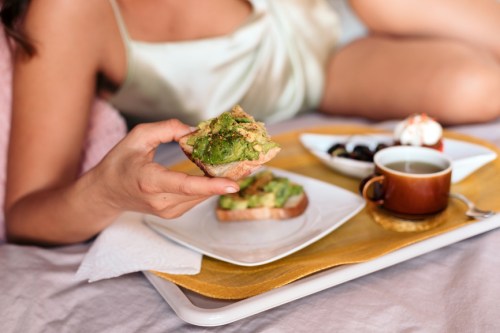We all have heard how important it is to get seven to eight hours of sleep per night, but we don’t always hear about the importance of your sleep quality. Research shows that getting deep sleep is incredibly vital for our health.
Experts in This Article
plant-based dietitian and owner of Plant Centered Nutrition
registered dietitian and nutrition educator with Fresh Communications
registered dietitian with Frugal Minimalist Kitchen
registered dietitian and owner of Whole Self Nutrition
registered dietitian nutritionist and founder of Kid Food Explorers
registered dietitian nutritionist and owner of Gut Health Connection
registered dietitian nutritionist specializing gestational diabetes
registered dietitian nutritionist and weight-loss expert
registered dietitian nutritionist and owner of Mara McStay Nutrition
registered dietitian and owner of Melissa Mitri Nutrition
Deep sleep—also known as “slow wave deep sleep” or N3—is considered the deepest stage of sleep and helps the body repair and regrow tissues, build bone and muscle, and strengthen the immune system. The next phase, called REM sleep, is characterized by rapid eye movements, is associated with dreaming, and takes about 90 minutes on average to get into after falling asleep, per the National Library of Medicine. “REM sleep is critical for emotional processing and memory,” says Mara McStay, MS, RDN.
While REM was once thought to be the most important phase of sleep, newer data suggests that all phases of non-REM sleep (including deep sleep) are actually more important to restful and restorative shut-eye, per Johns Hopkins Medicine. Essentially, all phases of sleep serve an important purpose, and hitting them all each night is a key to feeling refreshed.
Sounds nice, no? In hopes of helping you land the juiciest, most joyfully restful sleep of your life, dietitian experts are sharing exactly what best practices they recommend for better rest (and REM cycles). Trust: There are a handful of helpful dos and don’ts when it comes to nutrition practices for deeper sleep—and they’re all just as simple as counting sheep.
6 RD-approved daily nutrition practices for deeper sleep
1. Eat enough throughout the day
One of the most underrated ways to get deeper sleep is to eat enough food to fuel your body during the day. Why? Because undernourished bodies tend to experience poor sleep.
“Eating enough food is an often overlooked factor in getting high-quality and adequate sleep,” says Caroline Young, MS, RD, RYT, owner of Whole Self Nutrition. “If you are under-eating or skipping whole essential food groups like carbohydrates, you will have a harder time falling asleep or staying asleep. You need to be nourished for the rest-and-digest part of your nervous system to be activated, which is essential for sound sleep.”
“If you are under-eating or skipping whole essential food groups like carbohydrates, you will have a harder time falling asleep or staying asleep.”
—Caroline Young, RD
That being said, there is somewhat of a “Goldilocks Phenomenon” that can happen when it comes to eating before bed, because eating right before bed can impede your ability to get quality sleep. Striking the balance between eating enough throughout the day but avoiding overeating before bed will help ensure you have better sleep.
“Focus on not going to bed too hungry or full. I recommend having your last meal two to three hours before going to sleep and then having a snack an hour or so before bed, because trying to sleep when you’re too hungry can keep you up. Conversely, trying to sleep when you’re too full could lead to being uncomfortable and may contribute to heartburn. Experiment with what feels right to you,” says Shannon Western, a nutrition counselor at Ease Nutrition Therapy.
2. Consider limiting spicy foods
“If you’re looking to get deeper sleep, try avoiding spicy foods and foods high in tyramine at your evening meal,” Dani Lebovitz, MS, RDN, founder of Kid Food Explorers says. Lebovitz says that spicy foods like capsaicin found in red pepper can cause heartburn and indigestion that is intensified by lying horizontal. Plus, spicy foods may cause you to sweat, which can lead to sleep disturbances throughout the night.
3. Go nuts before bed
Nuts are a good source of zinc, magnesium, calcium, and melatonin—all wonderful nutrients to support restful sleep. Kimberley Wiemann, MS, RDN shares recent research that points to the best nut to consume for deeper sleep: “Melatonin is a hormone that helps promote good sleep habit; an April 2017 study in Nutrients1 suggests that nuts in general contain melatonin, but pistachios have the highest content. Pistachios also contain magnesium which can help to relax muscles and regulate blood sugar levels,” Wiemann tells us.
Other types of nuts, like walnuts in particular, are associated with an improvement in sleep quality and less daytime sleepiness, per a February 2024 randomized-controlled trial in Proceedings2. According to Melissa Mitri, MS, RD of Melissa Mitri Nutrition, “You can enjoy a handful of nuts every day like walnuts, almonds, or pistachios for better sleep. These nuts contain the sleep hormone melatonin. They are also rich in magnesium and zinc, which are shown to decrease insomnia.”
4. Limit stimulants and depressants
Alcohol, which acts as a depressant, affects our sleep in a negative way by raising our heart rate and causing moments of waking in the middle of the night. “Avoid alcohol in the evening. While many find a cocktail, or glass of wine can relax them, and help them fall asleep, alcohol can disrupt sleep patterns, waking you up in the middle of the night,” says Kim Kulp, RDN, owner of Gut Health Connection.
When it comes to alcohol, it’s not just a hangover that we should consider. Deep sleep in particular is affected by drinking alcohol, because alcohol disrupts our ability to fall into REM sleep patterns. This often leads to low energy levels and poor brain functioning the following day.
Deep sleep in particular is affected by drinking alcohol, because alcohol disrupts our ability to fall into REM sleep patterns. This often leads to low energy levels and poor brain functioning the following day.
Then there is caffeine, which acts as a stimulant. When consumed too late in the day, it may interfere with your ability to fall asleep at night. “Avoid caffeine at least six hours before bedtime, or longer if you’re sensitive to it. Six to eight hours is about how long it takes for the stimulating effect of caffeine to wear off. Allowing your body enough time to metabolize it before you try to fall asleep will increase your chance of being able to fall asleep quickly,” shares Bri Bell, RD of Frugal Minimalist Kitchen.
5. Pack in the plants
You don’t have to go full plant-based to receive the benefits of a colorful diet. The increase in fiber, micronutrients, and minerals may be enough to change your sleep quality. “One study found that eating more fiber, and less saturated fat and sugar, resulted in more time spent in deep slow-wave sleep3. More saturated fat and sugar before bedtime may lead to lighter, less restorative, and disrupted sleep. Fiber-rich carbohydrates like sweet potatoes, brown rice, and oatmeal can stimulate the release of serotonin, which has been linked to helping you doze off and sleep well throughout the night,” says Nichole Dandrea-Russert, MS, RDN, owner of Purely Planted Wellness.
“Fiber-rich carbohydrates like sweet potatoes, brown rice, and oatmeal can stimulate the release of serotonin, which has been linked to helping you doze off and sleep well throughout the night,” says Nichole Dandrea-Russert, RD.
One of the key deep-sleep micronutrients in plant-based foods is magnesium. “Magnesium plays an important role in regulating the body’s circadian rhythms and helps promote relaxation. Foods that are rich in magnesium include dark leafy greens, legumes, nuts, seeds, and whole grains,” Ashley Kitchens, MPH, RDN, plant-based dietitian and owner of Plant Centered Nutrition says.
6. Craft a (booze-free) nightcap
Several beverages have been especially linked to deeper sleep. Our experts recommended a variety of nightcaps from warm bone broth, to healing turmeric milk, to a shot of tart cherry juice depending on your lifestyle, goals, and food preferences:
- Bone Broth: High in glycine, bone broth contains this amino acid linked to overall better quality sleep and falling asleep faster. “I recommend Azuluna’s Chicken Bone Broth because it’s pasture-raised and delicious for sipping,” says Bianca Tamburello, RDN.
- Warm Milk: “You’ve probably heard about the connection between the melatonin and tryptophan content of warm milk and sleep. Perhaps just as powerful is the psychological link between warm milk and bedtime as a child. Whatever the reason, drinking warm milk before bed may help you sleep more deeply,” says Lisa R. Young, PhD, RDN.
- Turmeric Milk: If you don’t love the taste of warm milk, consider turmeric milk. Moushumi Mukherjee, MS, RDN shares why she loves turmeric milk before bed: “This is my go-to for a good night’s sleep. Milk has tryptophan which is an amino acid that can help with sleep—and that, along with turmeric, is called golden milk. It has a soothing property, and calms down aches and pains that can disrupt your sleep pattern.”
- Tart Cherry Juice: “A two-ounce shot of tart cherry juice about 30 minutes before bed will increase melatonin production. This will make it easier to fall asleep and then assist in muscle recovery while you snooze. Enjoy it on its own or in a mocktail. Tart cherry juice is also high in antioxidants and polyphenols,” says Taylor Grasso, MPPD, RD, Owner of Simply Healthy.
—reviewed by Angela Holliday-Bell, MD
Meng, Xiao et al. “Dietary Sources and Bioactivities of Melatonin.” Nutrients vol. 9,4 367. 7 Apr. 2017, doi:10.3390/nu9040367
↩︎Izquierdo-Pulido, Maria, et al. “Walnut consumption improves sleep quality: A randomized-controlled trial.” The 14th European Nutrition Conference FENS 2023, 28 Feb. 2024, https://doi.org/10.3390/proceedings2023091381.
↩︎St-Onge, Marie-Pierre, et al. “Fiber and saturated fat are associated with sleep arousals and slow wave sleep.” Journal of Clinical Sleep Medicine, vol. 12, no. 01, 15 Jan. 2016, pp. 19–24, https://doi.org/10.5664/jcsm.5384.
↩︎
Sign Up for Our Daily Newsletter
Get all the latest in wellness, trends, food, fitness, beauty, and more delivered right to your inbox.
Got it, you've been added to our email list.










